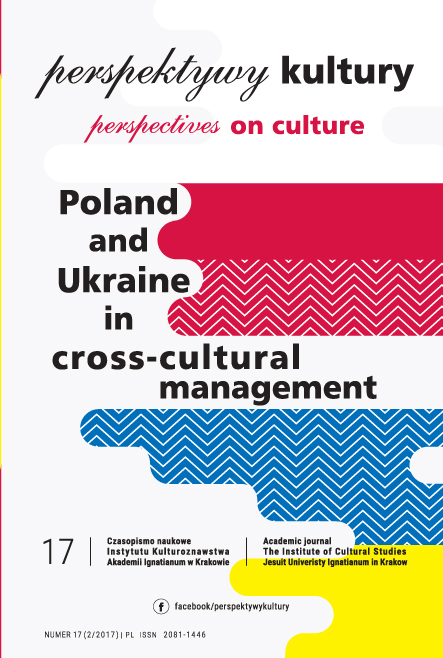Ukrainian and Polish Culture of Management and Work – Similarities and Differences
Abstract
The aim of the article is to present the results of the research study of management and work cultures in Poland and Ukraine that was conducted in 2016. The author analyses similarities and differences in organizational behaviours in three aspects:
1) management style – in both cultures respondents pointed out hierarchical style as dominating, but in the case of Poland in a lesser degree than in the case of Ukraine.
2) team work – in both cultures collectivistic approach in team- work is predominating, thus co-workers help each other and appre- ciate good atmosphere (harmony).
3) communication style – people in both cultures communicate emotionally, however Poles express their more through higher and emotional voice, whereas Ukrainians express their feelings also via body language.
Commonly Polish and Ukrainian cultures are regarded as very close as both countries have the same religious, cultural and ethnic roots. Ukrainians and Poles manifest a number of the same organiza- tional behaviours, according to the GLOBE (Global Leadership and Organizational Behaviour Effectiveness) study – Polish and Ukrainian cultures belong to the same cultural cluster – Eastern Europe (which constitutes one of ten distinguished clusters) and are different from oth- er clusters, but still there are differences between both cultures which matter in inter – cultural management. Crucially, one cluster contains several countries and they differ from each other in a subtler manner.
References
BERRY John W., POORTINGA Ype H., SEGALL Marshall H., DASEN Pierre R. 2002. Cross-cultural psychology. Research and applications, Camb- ridge: University Press.
HOFSTEDE Geert. 2007. Kultury i Organizacje, Warszawa: Polskie Wydaw- nictwo Ekonomiczne.
GHEMAWAT Pankaj. 2001. Distance still matters, The hard reality of global expansions, Harvard Business Review 79 (8): 137-147.
Culture, Leadership, and Organizations: The GLOBE Study of 62 Societies. 2004. R. House, P. Hanges, M. Javidan, P. Dorfman, V. Gupta (eds.). Tho- usand Oaks: Sage.
OBŁÓJ Krzysztof, WĄSOWSKA Aleksandra. 2014. Zarządzanie międzynaro- dowe, Warszawa: Państwowe Wydawnictwo Naukowe.
Raport „Badanie kultury zarządzania i pracy w Polsce i na Ukrainie – podo- bieństwa i różnice”, Fundacja Polski Instytut Mentoringu, 2016.
TROMPENAARS Alfons, HAMPDEN-TURNER Charles. 2012. Siedem kultur kapitalizmu, Warszawa: Oficyna Wolters Kluwers.
Copyright (c) 2017 Jesuit University Ignatianum in Krakow

This work is licensed under a Creative Commons Attribution-NoDerivatives 4.0 International License.
Autor, zgłaszając swój artykuł, wyraża zgodę na korzystanie przez Wydawnictwo Uniwersystet Ignatianum z utworu na następujących polach eksploatacji:
- utrwalania utworu w formie papierowej, a także na nośniku cyfrowym lub magnetycznym;
- zwielokrotnienia utworu dowolną techniką, bez ograniczenia ilości wydań i liczby egzemplarzy;
- rozpowszechniania utworu i jego zwielokrotnionych egzemplarzy na jakimkolwiek nośniku, w tym wprowadzenia do obrotu, sprzedaży, użyczenia, najmu;
- wprowadzenia utworu do pamięci komputera;
- rozpowszechniania utworu w sieciach informatycznych, w tym w sieci Internet;
- publicznego wykonania, wystawienia, wyświetlenia, odtworzenia oraz nadawania i reemitowania, a także publicznego udostępniania utworu w taki sposób, aby każdy mógł mieć do niego dostęp w miejscu i czasie przez siebie wybranym.
Wydawca zobowiązuje się szanować osobiste prawa autorskie do utworu.





